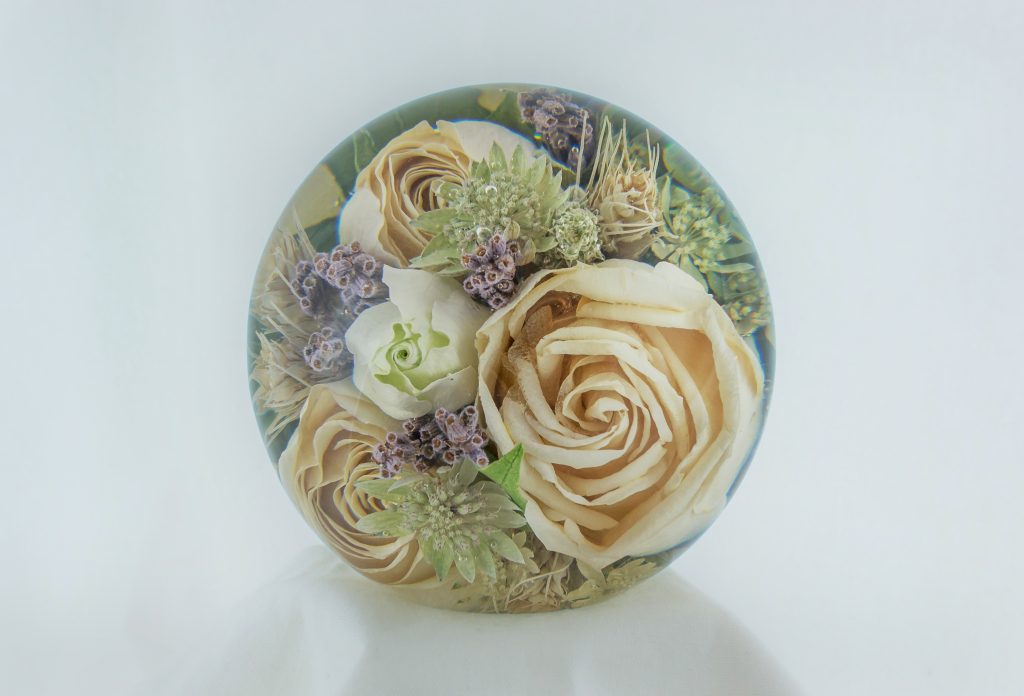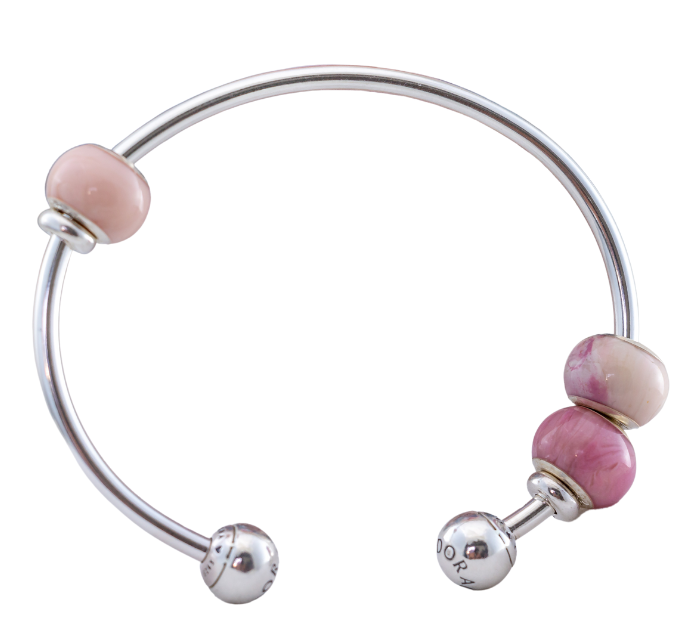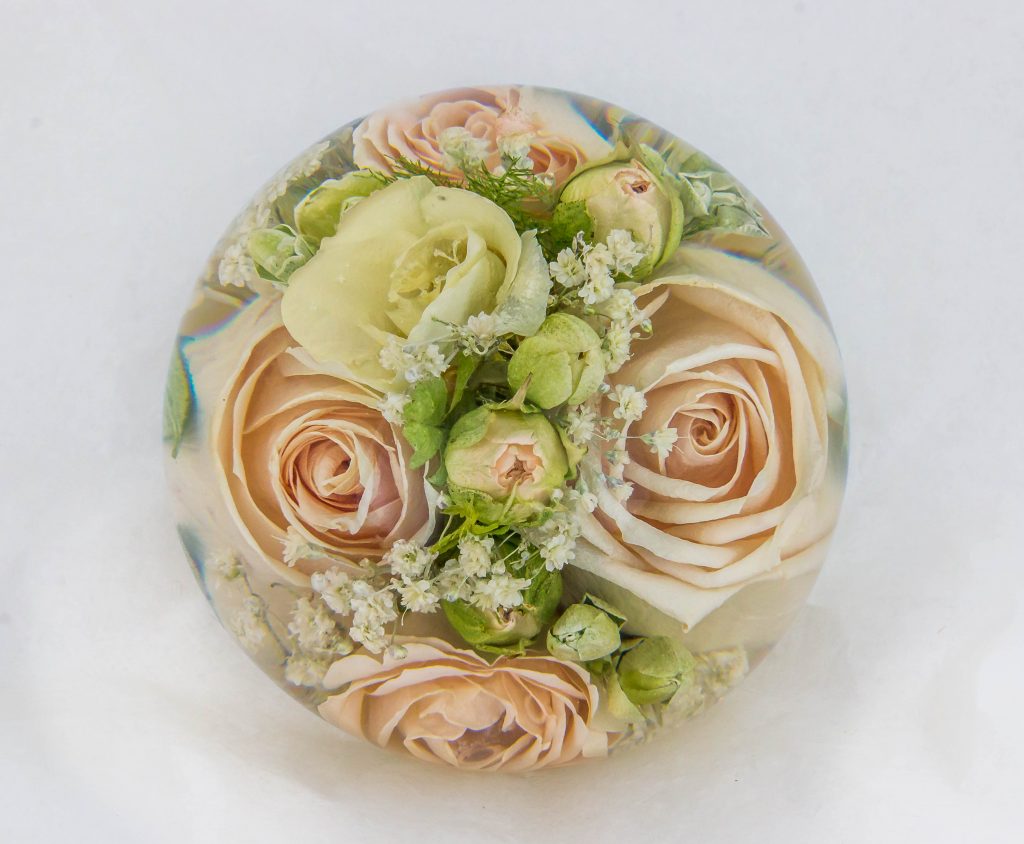How to preserve your own flowers at home?
Tips and useful information from our founder Rachael Ruddle
As a professional preservation artist, I have had the pleasure of working with many beautiful flowers and helping to preserve them for years to come over my 35 years within the floristry industry.
We receive so many calls and emails asking us for advice on how to preserve your own flowers at home, we thought it was about time we answered some of your questions.
Here are some methods that I personally recommend if you want to have a try at home:
- Air-drying Flowers is a classic and effective method for preserving flowers.
To do this, first remove all the leaves on the flower stems. Using ribbon/string or an elastic band simply gather your flowers and tie them into a small bundle. Hang the bundle upside down in a dry, dark place, such as a laundry cupboard or unused warm space.
Following air drying we recommend they are then enclosed in an airtight container to stop humidity.
Completion Time – Approx 6-8 weeks depending on the variety of flowers.
Pros: Flowers are kept forever and can be kept as they were originally on a stem
Cons: As the flowers dry, they will reduce in size and almost certainly their colourings will turn a lot darker than their original colour. Flowers can turn mouldy if they are not fully airdried. In terms of displaying, you can place in a frame, or they can remain in an airtight container. This prevents dust forming on the blooms.
- Silica Gel is a more modern method of flower preservation and can be effective on certain varieties and colours. Silica gel is a desiccant that can absorb moisture from flowers, leaving them dry and preserved.
To use silica gel, you place the flowers in an airtight container with a layer of silica gel at the bottom. Ensure the flowers are cut with no stem and place them upright into the container, then gently pour the silica gel over the flowers, being sure to cover them completely. Seal the container and leave it for several days. The flowers will absorb the silica gel and retain their shape; however, their colourings will change dependant on the variety. A respiratory mask is essential when working with silica gel and resin.
Following using the silica gel method we recommend they are enclosed in resin.
Completion Time: Approx 7-21 days depending on the variety of flowers.
Pros: Flowers are kept forever and retain their shape whilst slightly shrinking
Cons: Flowers can change colour and will turn a lot darker/lighter than their original colour, appear wrinkly and they become brittle to the touch.
Professional Recommendation: If using silica gel is something you would love to try but not with your own flowers, we would highly recommend getting in touch with So Resin Studio – https//soresin.co.uk
- Pressing Flowers is another popular method for preserving flowers, especially those with flat or delicate petals.
To press flowers, place flowers between two sheets of absorbent paper, such as newspaper or blotting paper, and press them with a heavy object, such as a book or iron. Leave the flowers pressed for several weeks, then carefully remove them from the paper. Ensure the flowers are dry and free of water prior to pressing.
Following pressing we recommend they are then enclosed in an airtight container to stop humidity.
Completion Time: Approx 14-21 days depending on the variety of flowers.
Pros: This method can preserve the colour and shape of the flowers for many years but is best for flat flowers like pansies or daisies.
Cons: Over time, the flowers will fade irrelevant of what they are later placed within. They are also incredibly fragile and wafer thin.
Professional Recommendation: If pressing is something you are passionate about but do not want to try this at home, we would highly recommend looking at the work of Little Pressed Flower www.littlepressedflower.co.uk
- Freeze Drying Flowers is a less common method of preservation and is predominantly used by professionals within the flower preservation industry, this is mainly due to the cost of the freeze-drying equipment required. This is very effective for a vast range of flowers and foliage’s with some phenomenal results. Following freeze drying the flowers should always be placed within resin.
We are unable to provide any guidance on home freeze drying as this is not possible without the correct equipment. We have read online from several freeze drying flower posts that it is possible to freeze your flowers within your domestic freezer and we regret to inform you that this is just not realistic.
Like ice cream they will thaw very quickly, leaving the flowers in a worse condition than they entered.
We strongly advise these methods are not used without using a professional service.
There are several ways to display your freeze-dried flowers, they can be encapsulated within paperweights, coasters, bookends, tealight holders and jewellery items.
Completion Time: Approx 16-24 weeks depending on the variety of flowers and moisture content.
Pros: Once enclosed in resin they will last forever and can be passed through generations as an heirloom
Cons: Professional use only, there only a few preservation artists using this method in the UK.
No matter which method you choose, remember that preserved flowers are delicate and should be handled with care to avoid damaging your flowers.
With the right technique and a bit of creativity, you can enjoy the beauty of your favourite flowers for years to come.
Check out our MYO (Make Your Own) boxes which are readily available online. These boxes contain professionally preserved freeze-dried flowers ready for you to try at home. Click here to buy online
If you are wishing to preserve your own wedding or occasional flowers at home we highly recommend trying any method on non-sentimental flowers before trying on sentimental ones just in case the results aren’t as you had hoped. They cannot be replaced.
Recommended Suppliers:
Silica Gel: HOME | Geejay (geejaychemicals.co.uk)
Moulds: Masterpiece Moulds Masterpiece Moulds – Etsy UK
Modern Mold Shop modernmoldshop – Etsy UK
Resin: Elichemresins Art Resins | Clear Resin | Eli-chem Resins (elichem.co.uk)
Freeze Drying Machine: Multidriers (freezedriers.com)
Some of our work below



